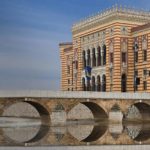Time Heals Old Wounds and Brings New Challenges
During those dark days of the war Austria was no place for homosexuals. It is well known that pink triangles and Jews were shipped off to death camps. But nearly 7 decades later justice and freedom have long overt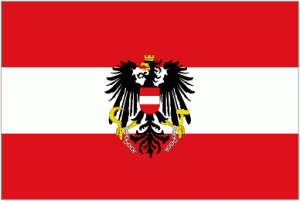 aken socialistic destruction and homophobic violence. Today the reigning ethos is respect and equal rights human rights.
aken socialistic destruction and homophobic violence. Today the reigning ethos is respect and equal rights human rights.
There is still work to do in the streets and in the courts to bring about full tolerance and equality in Austria. The strong Catholic church influence and resurgent skinhead extremism are constant threats to continued humanistic progress.
At the same time, the ‘evening belongs to everyone’, as the saying goes, especially at the elegant Regenbogen Rainbow Ball that takes place during the Viennese ball season (late winter) in the grand Park Hotel Schonbrunn. Nothing could be more different from the grim past than this regal celebration of gay pride an dignity; indeed, it seems that gay Austria is making up for it losses by staging this magical celebration of life, love, elegance and culture.
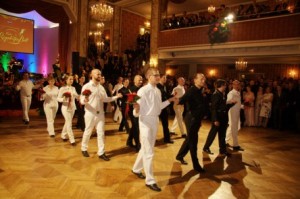 The Regenbogen Rainbow Ball (photo left) has become an international charity event which has been steadily gaining popularity over last few years. Organized by the multiple gay communities in Austria, this event attracts participation from approximately 1,500 Gay, Lesbian, and Transgender guests from Austria and other countries. In the Park Hotel Schonbrunn, the main hall features a live orchestra whereas various other contemporary bands and DJs keep playing from many side lounges and hotel bars. An important attraction of this event is the midnight quadrille, which consists of guests dancing together in unison under the instruction of Master Wolfgang Stanek.
The Regenbogen Rainbow Ball (photo left) has become an international charity event which has been steadily gaining popularity over last few years. Organized by the multiple gay communities in Austria, this event attracts participation from approximately 1,500 Gay, Lesbian, and Transgender guests from Austria and other countries. In the Park Hotel Schonbrunn, the main hall features a live orchestra whereas various other contemporary bands and DJs keep playing from many side lounges and hotel bars. An important attraction of this event is the midnight quadrille, which consists of guests dancing together in unison under the instruction of Master Wolfgang Stanek.
In addition to the Ball, every year there is a gay pride Regenbogenparade (photo right) in Vienna. The Rainbow Parade is a political demonstration and colorful parade performed each year in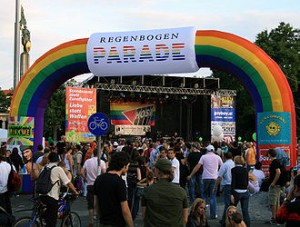 Vienna on the Ringstrasse. The event is committed to LGBT equality (and corresponds to the events in Germany in the Christopher Street Day parade and festival). This parade is the most important event of the gay, lesbian, bisexual and transgender movement in Austria.
Vienna on the Ringstrasse. The event is committed to LGBT equality (and corresponds to the events in Germany in the Christopher Street Day parade and festival). This parade is the most important event of the gay, lesbian, bisexual and transgender movement in Austria.
The HOSI organizing committee member Christian Högls said, “the ball has not lost its momentum, we will continue to dance and laugh. Entry tickets will be redeemable for prizes, and the good feelings are taken into a young new day. We wish that the guests “bring a positive feeling and a pleasant memory that lasts a long time, even after the last waltz and the final Radetzky March shortly after four clock in the morning. The relief finally shows to the organizers in their faces: the decision to rent the Park Hotel was a correct one. There are many people here, but it’s like a family. It’s a bit of home. And what did Dorothy say beyond the rainbow? There’s no place like home!” (http://www.hosiwien.at)
Legal Matters
Same-sex sexual acts in Austria have been legal since 1971. The age of consent was equalized in 2002 by a court decision. Homosexuals are not prohibited from military service. Following the ruling of the European Court of Human Rights in Karner v. Austria, co-habitating same-sex couples were given the same rights as co-habitating opposite-sex couples. As of 2010 same-sex couples can have registered partnerships, but not regular marriage and cannot adopt children or gain access to IVF or artificial insemination treatments. On 4 January 2010, the first four same-sex couples were ‘married’ in Vienna. A European Union poll showed that 49% of Austrians supported gay marriage.
The federal Labor Code has included an anti-discrimination law since 2004, to follow the implementation of EU legislation prohibiting discrimination. The 1993 Police Security Act requires the police to refrain from any actions that could create the impression of bias or that could be perceived as discrimination on the grounds of sexual orientation.
Gay Life Across the Country
The gay community is organized in all larger cities: Vienna, Linz, Innsbruck, Salzburg, and Graz.
Vienna has the largest gay population and the main LGBT organization is RKL, (Rechtskomitee LAMBDA), Austria’s LGBT-rights-organisation. “It was founded in 1991 and is committed to the realization and safeguarding of human rights of lesbians, gays, bisexuals and transgenders, i.e. the rights to equality, to autonomy and sexual self-determination.” (http://www.rklambda.at/index.php/en/about-rkl)
In the 15 years since its foundation RKL has achieved landmark political, statutory and court decisions essential for the rights and freedoms enjoyed by Austria’s lgbt-community today. It was one of the main driving forces behind the government legislation that approved registered same-sex partnerships in 2009.
In a landmark RKL-supported case in October 2005 unmarried same-sex couples are to be treated on the same footing as unmarried opposite-sex couples. There is however no partnership law and the ban on same-sex marriage is still standing. Legal protection against discrimination on the basis of sexual orientation is limited and mainly based upon European law.
Salzburg: The gay scene in this musical city is something not visible at first sight. There are only a few bars that are meeting points for gays and lesbians but people in general are open-minded. The Town Centre and Schallmoos districts are where gays like to congregate. The gay-welcoming Wolf-Dietrich Hotel is located right in the middle of this area. The tourist board advertises “romantic holidays” for gays in Salzburg.
Even if the picturesque streets of Salzburg’s historic city center seem to be filled with heterosexual baroque and Mozart fans at first glance, there’s more to it than meets the eye. 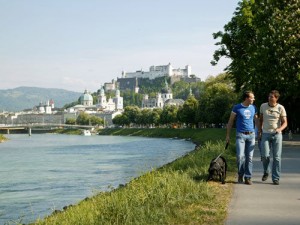 If you take a closer look on the streets and squares, in the parks, cafés and bars you’ll discover an active gay and lesbian scene among the city’s 150,000 residents. Whether at the Mozartwinkel café, claiming the “world’s best sticky nut buns,” at the stylish-swank Carpe Diem or on the rooftop terrace of the art deco Stein Hotel on the other side of the Salzach: the city’s gays are absolutely integrated and easily mingle with the hetero world.
If you take a closer look on the streets and squares, in the parks, cafés and bars you’ll discover an active gay and lesbian scene among the city’s 150,000 residents. Whether at the Mozartwinkel café, claiming the “world’s best sticky nut buns,” at the stylish-swank Carpe Diem or on the rooftop terrace of the art deco Stein Hotel on the other side of the Salzach: the city’s gays are absolutely integrated and easily mingle with the hetero world.
Evenings can be spent at one of the numerous restaurants, located between the city’s two hottest gay bars, the Princess in Priesterhausgasse and the 2-Stein on Giselakai. Those moving from one bar to the other simply have to strut past – there’s no better place to see and be seen! If you’ve come for a big gay evening event, check the dates for one of the HOSI (Homosexual Initiative) festivals four times a year at the ARGEKultur culture center.
The Linz gay guide greets visitors with this: “Dear visitors of Linz. The Linz city guide ‘Gay-in-Linz’ is finally here. Issue 2 is now available at all Gay and Gay-friendly hot spots. From gastronomy to culture to shopping and to beautiful people. A rich cultural and natural life are an important part of urban life quality here. You will be surprised by the eclectic offerings.
It is modern city full of dynamism and high quality of life. You can relax in the green oasis and resting places of the city. Linz is a stage both for theater and music at its finest, as well as contemporary art, history and science museums. In addition to attractive architecture–modern glass buildings to historic stucco facades–culinary arts are not too short either. The sweet seduction ‘Linzer Torte’ is produced by the oldest cake recipe in the world and is a highly popular souvenir. (photo right)
Innsbruck: Gay and lesbian visitors to Austria will love Innsbruck, with a perfect setting in the Alps, many restaurants and GLBT nightlife, and perfect setting in Alpine ski country. Lovely Innsbruck is Austria’s fifth biggest city but possibly its most perfectly situated, on the banks of the River Inn (the town’s name means “Bridge on the Inn”) and 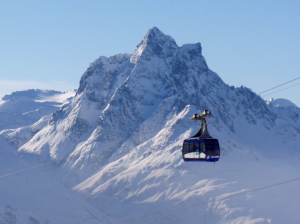 nestled in the foothills of the Alps. For gay and lesbian visitors, it’s also a GLBT-friendly and charming city, well worth a visit.
nestled in the foothills of the Alps. For gay and lesbian visitors, it’s also a GLBT-friendly and charming city, well worth a visit.
Read more: Gay-friendly Innsbruck
The best view in town is past the baroque buildings to see the looming mountains, covered with snow as early as August. (photo left) Within twenty minutes one can be at an Alpine ski resort in the Tyrol (once its own independent territory and until World War I) with its own distinctive cuisine, handicrafts, and history.

